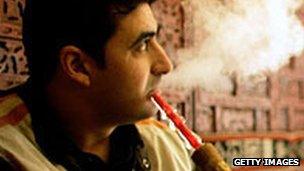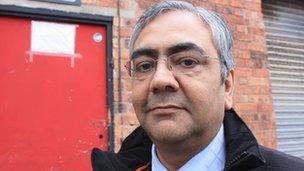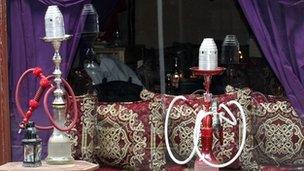Shisha clampdown: Concerns raised over fire and health risks
- Published

Shisha smoking is popular in Middle Eastern culture
Councils are considering bringing in licensing for shisha cafes, in an attempt to tackle the growing number of back-street premises.
Officials fear that more water-pipe bars are moving into enclosed premises, in a bid to escape anti-smoking laws.
Councils say licences may be needed because of the health and fire risks associated with shisha.
Freedom of Information requests suggest a there has been a 210% increase in the number of such cafes since 2007.
According to requests submitted to 133 UK councils, by the British Heart Foundation (BHF) for No Smoking Day, the number of cafes nationwide has risen from 179 to 556.
The World Health Organization has advised that a 40-minute session on a waterpipe is the equivalent to the volume of smoke inhaled from at least 100 cigarettes.
'Deathtraps'
Yet 84% of those surveyed thought it was fewer than 10.
About 44% of young adults, thought it was less harmful than cigarette smoking.
The survey also suggests more than a quarter of 18-to-24 year olds had smoked shisha.
The data also revealed that shisha smoking is no longer a pastime for specific ethnic groups, with 8% of people with white ethnicity saying they used it. The same number of non-smokers had also tried it.
The figures have come as no surprise to councils up and down the country trying to enforce the law.
Shisha cafes have to comply with smoke-free legislation by providing open-air canopies.
Govind Mandora, health and safety team manager for Leicester City Council, is concerned about a worrying recent trend with shisha establishments trying to avoid legal requirements.
He has serious concerns about the health and fire risks, and says the shisha smoking culture "is going underground".
"We are investigating and prosecuting several places in the city," he says.
"They're locating in back streets, even old industrial units, hidden from view.
"Customers hear about them via Twitter or Facebook and gain entry by pressing a buzzer by the locked door or making a call from outside on their mobile phone.
"These places are enclosed, often their doors are locked.

Govind Mandora is concerned about health and safety hazards in shisha cafes
"They are deathtraps, not just because of the fire hazard, but with the potential for carbon monoxide poisoning from the charcoal-fuelled tobacco."
Environmental health officers across the country are receiving reports of people collapsing through inhaling the smoke, even playing dangerous smoking games.
Ian Gray, principal policy officer for the Chartered Institute of Environmental Health said: "Students are filling their lungs with the smoke, in a kind of game, then passing out from the carbon monoxide.
"They are starved of oxygen. One GP reported a patient became breathless, with not enough oxygen in his blood. He was a hospital case. He'd been smoking shisha."
'Phenomenal profit'
Mr Gray said: "It's now a chic thing to do, especially among the young. It's becoming a young person's introduction to tobacco. I'd like to see a licence for selling tobacco, like they have in Scotland."

Shisha cafes have had to adapt to smoking bans across the UK
Janet Bradley, Birmingham City Council's operations manager for team enforcement, said: "These places are like 1940s snugs. There's a phenomenal profit.
"It's less risky. One assistant in a bar who helps light the coals, by drawing it through the waterpipe, told me how a customer collapsed after smoking for a couple of hours.
"Even the assistants are at risk because of the time they spend in there. We're even seeing shisha bars hired for 18th birthday parties."
One close relative of a 14-year-old in Leicester, who did not want to be identified, described how her nephew and a group of friends were trapped in a shisha cafe.
"They went into the cafe to watch television, but the cafe is encouraging underage smoking. I was horrified to hear that the boys wanted to leave and couldn't.
"My nephew was traumatised. Parents just aren't aware of the risk.
"The shisha smoking is bad for your health, to say nothing of the potential fire hazard with the charcoal burning in the hookah in a room with locked doors."
Leicester City Council is now considering using licences to regulate the cafe culture more stringently.
"This is a nationwide problem, it's no longer a niche pastime, but mainstream" said Mr Mandora.
The manager of a shisha cafe in Leicester, who didn't want to be named, said he was losing a significant amount of trade to the underground scene.
"I asked my customers why I don't see them so much, they said it was warmer in the back street enclosed premises, it's too cold here, because my premises is partly open.
"I've lost about 25% of my trade trying to be above the law, we invested £120,000 in this business, but I'm still in dispute with the council over compliance."
- Published4 January 2012
- Published23 February 2011